- Home
- Alex Archer
Paradox Page 3
Paradox Read online
Page 3
Annja had no idea what she was going to do for lunch. But after a morning of Doug and his antics she just had to get away from the show and everything connected to it for a while. Even if she just walked aimlessly the whole time. Actually, even if she stood banging her forehead against the corner of a building.
Her phone rang. She pulled it from its carrier. The number was unfamiliar. She thumbed Answer anyway. What the hey? She was an adventuress, wasn't she?
"Ms. Creed?" asked a man in a slightly Middle Eastern accent.
"Yes," she said in a neutral tone. Irrationally she started flicking her eyes all around, studying the slow-moving tourist swarms and the busy locals bustling past them with their usual welcoming snarls and occasional shouted obscenities. If anyone was stalking her they probably wouldn't need to resort to a trick like dialing her number and seeing who answered. But she also had a well-honed aversion to taking things for granted.
"I hope you will forgive me bothering you. This is Levi."
"Levi?"
"Rabbi Leibowitz. I met you last night at dinner at the Penthouse."
"Oh. Yes. Rabbi. How are you?" Politeness, her default mode, took over. Very few people, herself definitely included, thought of her as a Southerner, although to all practical purposes she was, having been raised in New Orleans. She was a New Yorker through and through. She was most particularly not a Southern belle. But the sisters at the orphanage had brought her up to be polite, and on the whole, she was pleased with that. Unlike a great many other elements of her upbringing.
"Oh, I'm fine, fine, Ms. Creed. And I'm terribly sorry if I or my associates offended you last night."
"No. I wouldn't say offended is the word." She could think of plenty others. But gratuitous meanness didn't form a major component of her personality. She liked to think, anyway. Besides, there was something about the rabbi's halting voice that struck a chord inside her. A quality of vulnerability. Of innocence.
"But not too favorably impressed."
"Well…not with your associates. To be perfectly candid with you, Rabbi Leibowitz, I hate to think of myself as giving in to guilt by association. That said—given that you chose to surround yourself with such associates, and their project—I formed a certain impression of you. I apologize if I judged you unfairly. I guess I'm as subject to human frailties as anybody."
He laughed. "Oh, don't say that, Ms. Creed. And please don't judge the men you met with me last night too harshly. They are good men, whatever their enthusiasms."
"It's good men I've learned to fear most in the world, Rabbi. Especially the enthusiastic ones. Look, I'm willing to admit I may have judged you too hastily. I apologize for that. Now, if you'll excuse me—"
"Please, Ms. Creed." His voice pulsed with urgency. "Hear me out. I'm not really concerned…with your opinion of me. But I think it would be a great tragedy if you passed on participating in this project without hearing certain aspects of it that, that maybe got glossed over last night. And I'd like to ask you, as a favor to me, even though you certainly don't owe me anything, if you would at least examine my credentials online. I'm not in fact a colleague of yours, strictly speaking—I'm no archaeologist, naked or otherwise."
She had to laugh at that.
"I am an antiquarian, a historian, a scholar of ancient languages. I believe this expedition could add significantly to the sum of human historical and cultural knowledge."
"Let me ask you flat out," she said. "Do you believe in the literal truth of Genesis?"
His laugh sounded incredulous. A lot like she figured hers would have sounded if faced with the same question. "Oh, certainly not, Ms. Creed. Very few educated Jews today believe any such thing. Certainly few serious scholars, of which I flatter myself I'm one. But I ask, does that mean there cannot be something there, on that frightening mountain surrounded by very frightening people, that could still be worth unearthing?"
She felt her pulse quickening. The old atavistic joy of the hunt. Sneaking into eastern Turkey, in the heart of a war zone, and climbing to a mountain height where no official expedition had been allowed—it was hard to resist a challenge like that.
"All right, Rabbi," she said. "I haven't bought into this yet. But I gather you have a pitch for me. I'm willing to hear it. All right?"
"Oh, that's wonderful, Ms. Creed. Thank you so much. Are you free for lunch?"
* * *
RIGHT AROUND A CORNER FROM the television studio was a fancy coffee shop of a sort she usually avoided, mostly because they exuded a self-satisfied smugness that just scraped right up her spine. She bought a cup of coffee for a price outrageous even in the Big Apple, she thought as she walked away from the counter.
No seats were available in the crowded shop but there was some counter space by the window where she could unlimber her notebook computer and avail herself of their "free" Wi-Fi—although to her mind that was what she paid the steep coffee tariff for.
She ran Leibowitz, Rabbi Levi through Google. She would have done it the night before if she'd thought she'd ever have any more dealings with him. But when she took her leave of him and his companions nothing had been farther from her intent.
As soon as the search results began to pop up she wondered if maybe she should have checked after all. Interesting, he looks legit, she thought.
She had been inclined to dismiss him as some kind of right-wing Israeli nut of the sort who tended to run with a certain breed of U.S. militarists—ones like Baron and Bostitch. Instead, she found, he was a homeboy of hers, Brooklyn-based, a high-level genius making his name in the world as a leading authority on ancient Middle Eastern languages and cultures. If not, as he confessed, precisely a colleague of hers, he was a heavyweight in a closely related discipline. Because their areas of specialization—his the ancient Middle East, hers Renaissance Europe—lay so far apart, she'd never come across his name before.
It did surprise her that she hadn't seen his name on any of the fringe archaeology newsgroups she followed when time and energy allowed. The possible existence of Noah's Ark, or really any significant artifacts on the perpetually frozen top of a mountain, was right in the zone for discussion in those groups.
* * *
"I HOPE I'M NOT LATE," Levi said, sliding into a chair across from her.
They were in a Cantonese restaurant tucked away on Mott Street above Canal, in a part of Chinatown where the locals still seemed successfully to be resisting the inroads of the hipsters. The lunch crush had mostly eased. The restaurant smelled of hot oil and a touch of spice. The soft gurgle of a fountain mostly drowned out the conversations around them.
"Not at all, Rabbi," she told him. "I just like to get to a place early."
So I can get a look at the party I'm meeting as he approaches, see if he's acting strangely or has unexpected company, she thought. And so I have the best possible chance of getting a seat away from the windows and doors, so I'm harder to spot from the street. She'd made a practice of all of those things long since inheriting the sword had put her in almost constant danger.
He smiled cheerfully at her. "Try the wonton soup," he said. "It's to die for."
"Sounds good. I haven't been here before. It smells good, though. I'm always looking for a good new Chinese place."
A tall, young waiter took their orders. They ordered the soup; Leibowitz specified "no noodles," but she let it go. He ordered duck braised in soy sauce. Annja went for the crispy bean curd stuffed with chopped shrimp.
When the waiter left he smiled shyly at her. "I always order it without noodles," he said. "You get lots more wontons that way."
"Good thinking," Annja said.
"Are you sure you're not Jewish, Ms. Creed?" Leibowitz asked. The waiter returned and poured them each a cup of steaming green tea. "After all, if there's one characteristic the Chosen People have in common, it's love of Chinese food."
"Not that I know of. In my case it's more just a New York thing."
She sipped tea. The warmth felt welcome after t
he day's chill. And green tea always felt nourishing to her somehow. Although in this case that mainly served to remind her how famished she was.
"Although I guess I could be part Jewish," she added.
The truth was, she didn't know much about her lineage. Her parents had died when she was very young, leaving her with no surviving family and little by way of family records or possessions. None that had ever come Annja's way, in any case.
"Please don't be put off by Charlie and Leif and their naive enthusiasms," Leibowitz said. "They mean well, but—" He shrugged. "I don't think they really understand the concept of intellectual rigor."
"Probably not," Annja said. "It gets pretty annoying, sometimes, when amateurs get out of their depth with the science, and start talking about things they don't really understand."
He nodded vigorously. "That's so true. It's the same with scholarship—especially ancient languages. And this whole Biblical-literalness thing—" He had got himself worked up enough to be so flustered he couldn't continue, but could only wag his head like a dog in denial.
He's definitely a nerd, she thought. Also a bit of a fanatic. But not the sort of fanatic she'd been afraid he was at first. He was clearly fanatical on his subject: ancient languages and cultures.
Not like that's a bad thing, she thought.
"So you were saying you don't believe in Biblical inerrancy."
"Oh, of course not, Ms. Creed. Stories such as the Garden of Eden and the Flood are allegories. They were written by ancient mystics who never intended for them to be taken as factual accounts. They convey profound truths about humanity and its relationship to the Creator. And haven't fables always been a powerful tool for teaching?"
"True enough."
"In any event, to talk about any kind of 'inerrancy' in the Bible, what you call the Old Testament or New, or any ancient writings really, is just absurd. Leaving aside the doubtful provenance of whole sections of the holy books, they're filled with errors. I mean, what we'd call simple typos. Remember they were copied out time and again by hand, not always by people who were particularly literate in the character set they were using. Not always literate at all, so far as we can tell—sometimes religious communities found themselves so sorely pressed for one reason or another texts had to be copied by artisans who basically reproduced the characters as images. Pictures, not units of meaning. It's one reason the whole Bible Code concept is so unworkable as well."
Annja nodded. Their soup arrived. It was topped with chopped cilantro and finely sliced pickles. She tasted hers. The broth was hearty and cleverly flavored with herbs.
"This is delicious."
He smiled. It obviously pleased him to please her. That could get to be a problem, although he didn't seem the sort to push a schoolboy crush anyplace unpleasant.
"Yet, despite all that you tell me, you still think it's worthwhile going up that mountain?" she asked him.
"Oh, absolutely. You saw the artifacts they had?"
"Sure. And the documentation was in order. I'm not a carbon-14 dating expert, but I know enough to recognize the numbers were all in the right column. I don't have any reason to doubt the wood is as old as they say."
"So how did it get there, Ms. Creed?"
She tipped her head to the side. "Not by any flood, I'm pretty sure."
"Me, too."
"How, then?"
He laughed. "I don't know! But I want to find out."
Their food arrived. In his enthusiasm the rabbi fidgeted in his seat while the waiter set down their dishes. Then he leaned forward over the table, oblivious to the way the steam rising from his duck fogged his glasses.
"What I am sure of is that whatever's on top of the mountain—this so-called Ararat Anomaly—is a human construct. It must be of inestimable historical value."
She drew a deep breath, heavy with the fragrant steam. "You make a compelling case, Rabbi," she said.
"Levi. Please."
"Levi. Okay. I just—I'm not sure about the kind of people we'd be going with."
He shrugged. "I've led a sedentary life, Ms. Creed. I am a scholar, a man of books, of knowledge, of contemplation. But I am willing to undergo whatever hardships, do whatever it takes, to uncover this secret." He gave the impression he'd be willing to take his chances with almost anyone, if that would get him at whatever knowledge lay buried in the eternal snows of Ararat.
She wondered if it were some kind of twisted prejudice of hers, to find his scholar's zealotry so laudable, and that of Bostitch and his Rehoboam boys so scary.
He smiled. "Anyway, from what Charlie and Leif said about you, you have a reputation in certain circles for taking risks and coming back alive. I figure I'll be all right if I just stick close to you!"
She ate as she studied him. Not much deterred her from eating when she was hungry. Her lifestyle meant she took in a lot of calories and used them all.
You've been taken in before, she reminded herself. But the rabbi would have to be a diabolically skillful actor to fake this goofy artlessness, this seeming fundamental decency. He strikes me as kind, she thought. There's a virtue I encounter way too infrequently.
She sighed. "I hope I can live up to your expectations, Levi," she said. "I'll certainly try."
He lit up. "You mean you'll do it?"
"Against my better judgment," she said, "yes."
Chapter 4
Annja was sitting at a table with a lot of men in a hotel conference room in Ankara, Turkey.
"You must understand," said the enormously tall, gaunt man with the eagle's-beak nose and dark circles under his eyes, "that there exist certain elements within my government who…resent American patronage of Kurdish separatists." He wore an olive-drab military uniform with a chestful of colorful ribbons.
The room air-conditioning worked with a nasty subliminal whine. It was a race whether it would slowly but inexorably give Annja a blinding headache or drive her mad. It worked though, keeping the temperature to arctic levels despite unseasonable heat in the streets of the Turkish capital outside, almost three thousand feet above sea level in the middle of the central massif of the Anatolian peninsula.
Unfortunately, it also reacted in some insidious way with the smoke generated by their host's harsh-smelling Turkish cigarette to produce about the same reaction as tear gas in Annja's eyes. The Ankara Sheraton had a strict no-smoking policy. Apparently being a general of the Turkish army allowed you to opt out on that. Big surprise there, Annja thought.
"Well, General," Leif Baron said, leaning back in his chair and tapping a pen on the polished tabletop before him. "You should understand the Kurds have been our good friends in Iraq. They're the best indigenous allies we have there. What was that, Mr. Wilfork?"
"Nothing of consequence," said the man he'd addressed the last question to. He answered in what sounded to Annja like an Australian accent. It had also sounded as if he'd muttered, "The only ones who don't switch sides or bloody run away," under his breath at Baron's mention of the Kurds.
He wore a tan tropic-weight suit that fit his bulky frame as if he'd picked it off the rack, possibly at Goodwill: the suit was taut to near splitting at the shoulders, straining the buttons over his belly, the fabric bagging and rumpling at the chest. Despite the room's chill he mopped at his big crimson face with a scarlet handkerchief. His hair was thinning, combed over the top and white-tinged with yellow, although Annja had the impression he was only in his early fifties. She glanced at the equally tall and out-of-shape-looking Charlie Bostitch, who lounged across the table from the general at Baron's side, looking smug and at ease.
"Nonetheless, the United States has seen fit to provide assistance to certain Kurd groups internationally recognized as terrorists," the general said. "Indeed, the United States itself so recognized them, before they found a use for their services. Please, gentlemen—I do not raise these points in order to obstruct or cause complications. I, too, am eager for this expedition to take place. But it must be founded on a realistic appra
isal of the situation, yes?"
"We've paid out plenty of money," Baron said, lounging back in his seat and crossing one leg over the other. He wore a pale yellow polo shirt, stretched tight over the bulging muscles of his chest and upper arms, and khaki trousers. "That ought to smooth our way."
"Now, now, gentlemen," Bostitch said, shaking his head. "Why don't we all just try to get along, here? We're men of goodwill. And the issues are bigger than all of us, after all."
General Orhan Orga gazed at him with his sad bloodhound eyes for a long moment before nodding.

 Rogue Angel: Forbidden City
Rogue Angel: Forbidden City The Spider Stone
The Spider Stone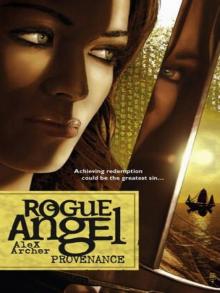 Provenance
Provenance Blood Cursed
Blood Cursed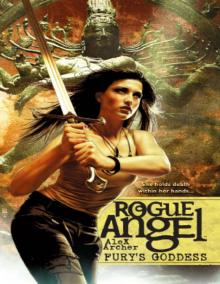 Fury's Goddess
Fury's Goddess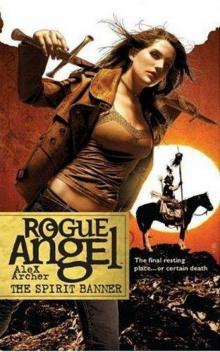 The Spirit Banner
The Spirit Banner Footprints
Footprints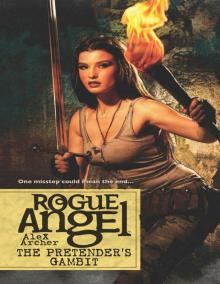 The Pretender's Gambit
The Pretender's Gambit Rogue Angel: The Lost Scrolls
Rogue Angel: The Lost Scrolls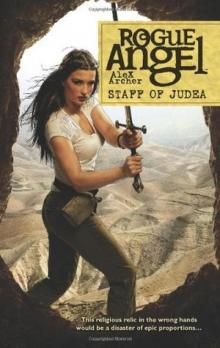 Staff of Judea
Staff of Judea Rogue Angel 55: Beneath Still Waters
Rogue Angel 55: Beneath Still Waters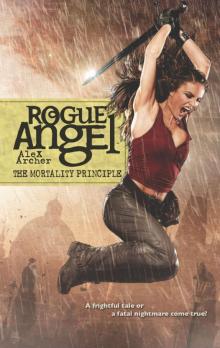 The Mortality Principle
The Mortality Principle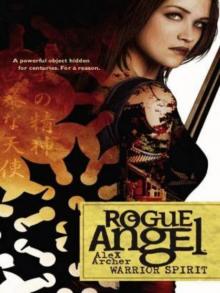 Warrior Spirit
Warrior Spirit Paradox
Paradox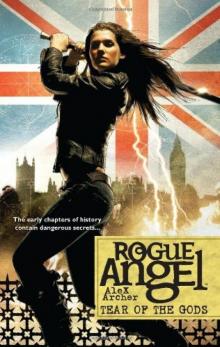 Tear of the Gods
Tear of the Gods Forbidden City
Forbidden City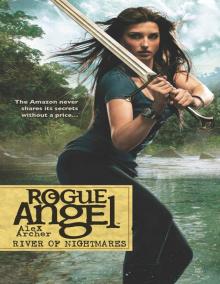 River of Nightmares (Rogue Angel)
River of Nightmares (Rogue Angel)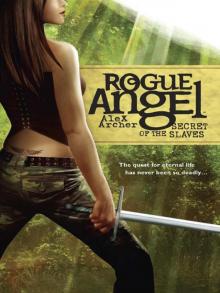 Rogue Angel: The Secret of the Slaves
Rogue Angel: The Secret of the Slaves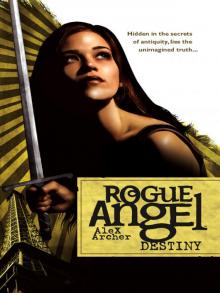 Destiny
Destiny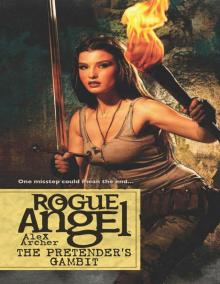 Rogue Angel 51: The Pretender's Gambit
Rogue Angel 51: The Pretender's Gambit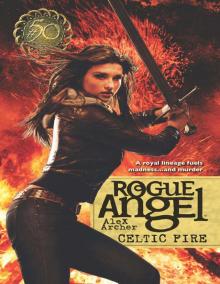 Celtic Fire
Celtic Fire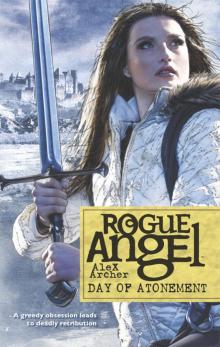 Rogue Angel 54: Day of Atonement
Rogue Angel 54: Day of Atonement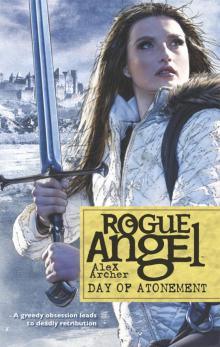 Day of Atonement
Day of Atonement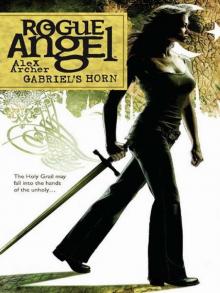 Rogue Angel: Gabriel's Horn
Rogue Angel: Gabriel's Horn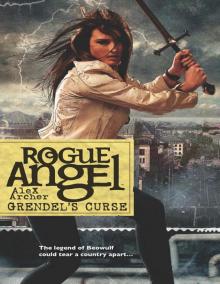 Grendel's Curse
Grendel's Curse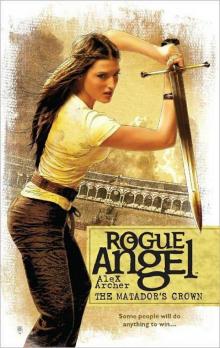 The Matador's Crown
The Matador's Crown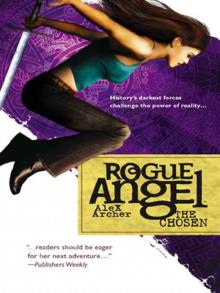 Rogue Angel: The Chosen
Rogue Angel: The Chosen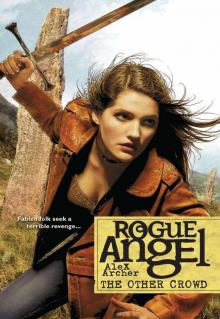 The Other Crowd
The Other Crowd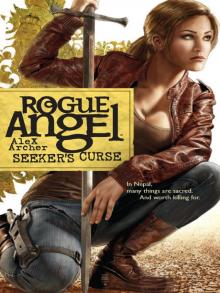 Seeker’s Curse
Seeker’s Curse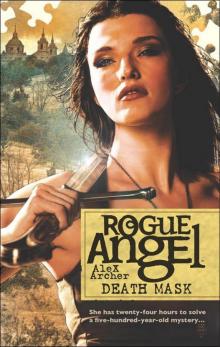 Rogue Angel 52: Death Mask
Rogue Angel 52: Death Mask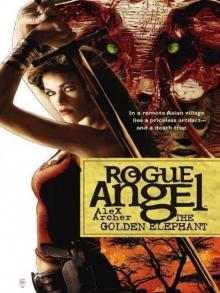 The Golden Elephant
The Golden Elephant Blood Cursed (Rogue Angel)
Blood Cursed (Rogue Angel)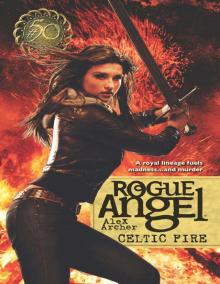 Celtic Fire (Rogue Angel)
Celtic Fire (Rogue Angel)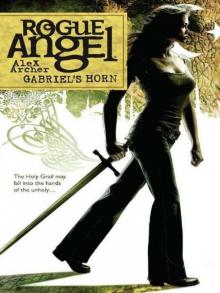 Gabriel's Horn
Gabriel's Horn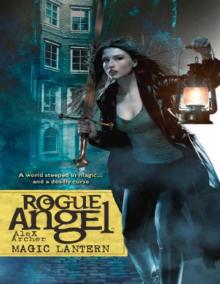 Magic Lantern (Rogue Angel)
Magic Lantern (Rogue Angel)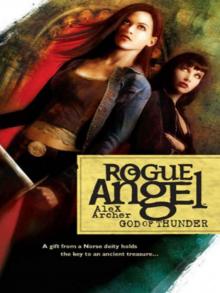 God of Thunder
God of Thunder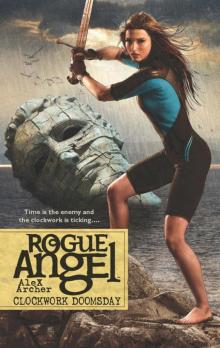 Clockwork Doomsday
Clockwork Doomsday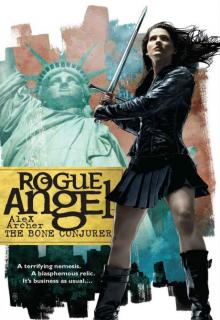 The Bone Conjurer
The Bone Conjurer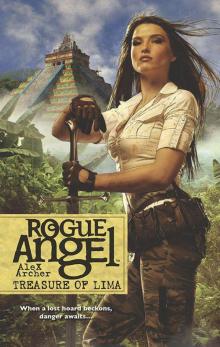 Treasure of Lima
Treasure of Lima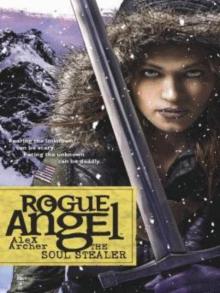 The Soul Stealer
The Soul Stealer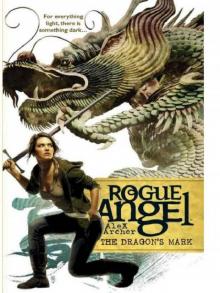 The Dragon’s Mark
The Dragon’s Mark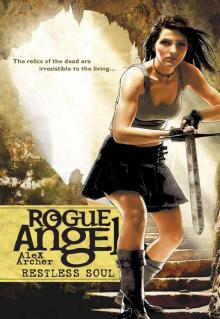 Restless Soul
Restless Soul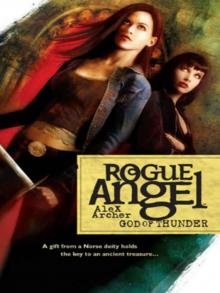 Rogue Angel: God Of Thunder
Rogue Angel: God Of Thunder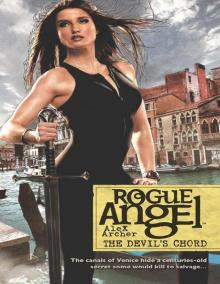 Rogue Angel 49: The Devil's Chord
Rogue Angel 49: The Devil's Chord Death Mask
Death Mask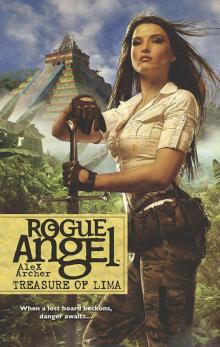 Rogue Angel 46: Treasure of Lima
Rogue Angel 46: Treasure of Lima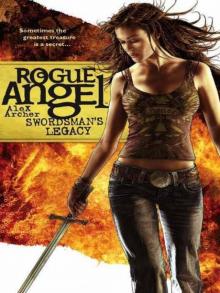 Swordsman's Legacy
Swordsman's Legacy The Oracle's Message
The Oracle's Message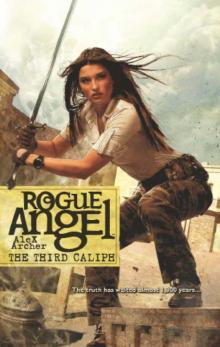 The Third Caliph
The Third Caliph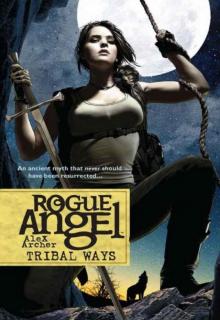 Tribal Ways
Tribal Ways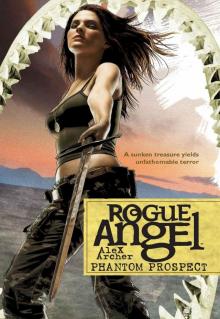 Phantom Prospect
Phantom Prospect Rogue Angel 50: Celtic Fire
Rogue Angel 50: Celtic Fire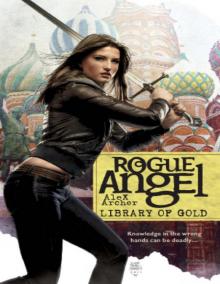 Library of Gold
Library of Gold Rogue Angel 53: Bathed in Blood
Rogue Angel 53: Bathed in Blood Sacred Ground
Sacred Ground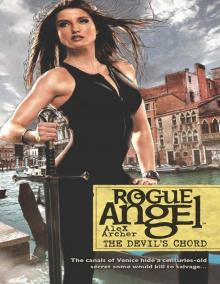 The Devil's Chord
The Devil's Chord Serpent's Kiss
Serpent's Kiss The Vanishing Tribe
The Vanishing Tribe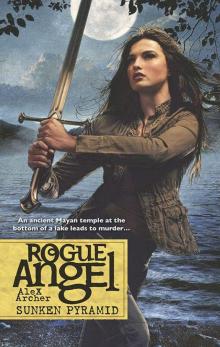 Sunken Pyramid
Sunken Pyramid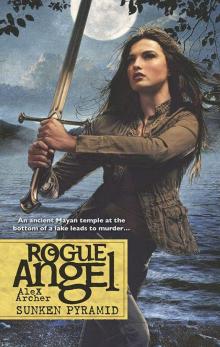 Sunken Pyramid (Rogue Angel)
Sunken Pyramid (Rogue Angel)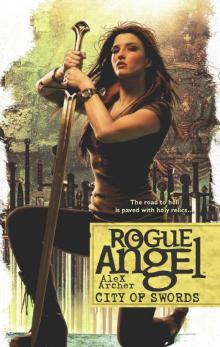 City of Swords
City of Swords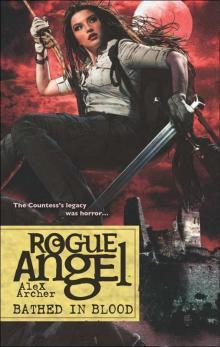 Bathed in Blood
Bathed in Blood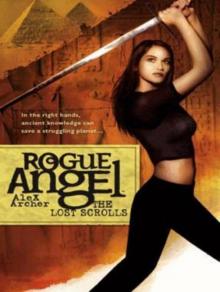 The Lost Scrolls
The Lost Scrolls The Babel Codex
The Babel Codex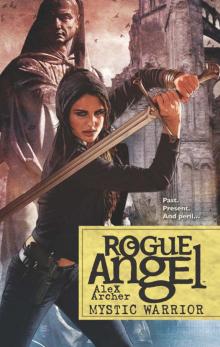 Mystic Warrior
Mystic Warrior Eternal Journey
Eternal Journey Beneath Still Waters
Beneath Still Waters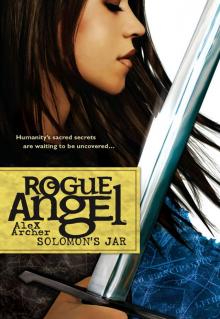 Solomon's Jar
Solomon's Jar Beneath Still Waters (Rogue Angel Book 55)
Beneath Still Waters (Rogue Angel Book 55) Cradle of Solitude
Cradle of Solitude Secret of the Slaves
Secret of the Slaves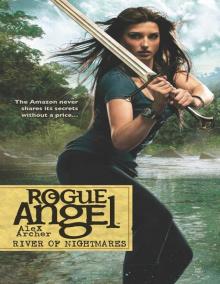 River of Nightmares
River of Nightmares Polar Quest
Polar Quest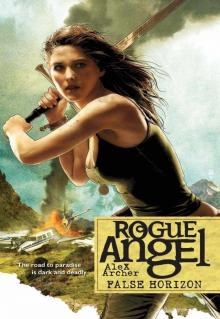 False Horizon
False Horizon